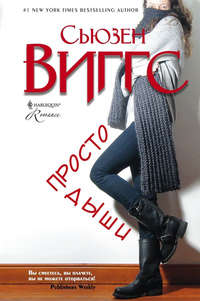
Полная версия
Just Breathe
Although biologically they were fraternal twins, most casual observers had trouble telling them apart. They had the same graceful drifts of white hair, the same eyes of milk glass blue. Their faces were all but indistinguishable, like two apples side by side, drying in a bowl.
Despite their physical resemblance, the sisters were polar opposites in many ways. Aunt May was conventional and neat as a pin. Gran was considered bohemian in her day; she preferred painting over housework and raising a family. More traditional, Aunt May dressed in calico cotton prints and crocheted shawls; Gran favored overalls and tribal print smocks. Both women, however, spent their lives fanatically devoted to family and community.
“You probably don’t want to talk about your meeting,” Aunt May suggested.
In this family, denial was a fine art. “I’ll spare you the details.”
Gran served the chai in a Raku-fired mug. “You probably need a break from brooding about all this nonsense, anyway.”
Sarah tried to smile back. Relegating her shattered marriage to “all this nonsense” did seem mildly amusing at that.
Her grandmother and great-aunt willingly changed the subject. They chattered on about the things that filled their days. Gran and Aunt May seemed to be completely without ambition or curiosity about the world beyond the quiet, protected bay. They organized things—the annual Primrose Tea. The Historical Society’s benefit banquet. They presided over a monthly bridge tournament and faithfully attended meetings of the garden club. Currently they were preoccupied with projects and plans, as always, working on their presentation on bulbs for the Sunshine Garden Club. And if that didn’t keep them busy enough, they had to get the place ready to host their weekly potluck and bunco game.
Sarah marveled at how seriously they took these social functions, as if they were matters of life and death.
The old women studied Sarah, then exchanged a glance filled with meaning. What was it with twins? Sarah wondered. They had some crazy Vulcan mind link, and seemed capable of holding whole conversations without saying a word.
“What?” Sarah asked.
“You don’t appear to have much patience for things like garden club meetings and bunco evenings.”
“I’m sorry, Gran. Just preoccupied. And tired, I guess.” She tried to look interested. “But if they’re important to you—”
“They’re important to all of humankind,” Aunt May said.
“Garden parties?” Sarah squeaked. “Bunco games?”
“Oh, dear. Now she’s irritated,” Gran said to her sister.
“I’m not irritated. Mystified, maybe, but not irritated.” Deep down, she wondered how it could possibly mean a thing that Reverend Schubert’s birthday party had fresh flowers or that they put out the good china for their potluck.
“Showing respect and thoughtfulness to those we care about is the part that matters. It’s what separates us from the beasts of the field.”
“The cows in Mr. Prendergast’s pasture seem pretty content to me.”
“Are you saying you’d rather be a cow?”
“At the moment, it sounds very appealing to me.” As a cheeky, awkward teenager, Sarah had unleashed her pen, drawing comic satires of the Historical Society’s display of the Drake landing, or creating send-ups of the women of the garden club, chattering away while birds built nests in their fantastically ornamented straw hats.
“Someday you’re going to tick off the wrong person,” her older brother, Kyle, had warned her. He had dedicated his life to pleasing his parents. Every time Sarah attempted to do this, she failed.
But mostly, she realized, she’d failed herself. When you lived your life to please others, there were hidden costs that often outweighed the rewards. Years later, in the wake of the ultimate failure—her marriage—she was finally waking up to that fact. Looking around her grandmother’s house, she wondered if she was seeing a glimpse of her future. The thought depressed her, and she felt the old ladies studying her.
“You’re home, dear,” said Gran.
“Home where you belong,” Aunt May added.
“I never really felt like I belonged here.”
“That’s your choice,” Gran pointed out. “Deciding where you belong is a choice.”
Sarah nodded. “But…I don’t want to be that divorced woman who moves back to her father’s house. That’s just…pathetic.”
“You’re entitled to be pathetic for a while, dear.” Gran smiled gently at her. “No need to rush into anything.”
With her grandmother’s permission to be pathetic, Sarah made her way down the lane to her father’s, passing marshes fringed by wild iris, with the green-draped coastal hills looming in the distance. She parked in the driveway and went into the garage, a handyman’s nirvana with an adjacent workshop. Generations of tools hung on the walls and littered the workbench, and the sharp odor of motor oil tinged the air. A half-dozen projects occupied benches and sawhorses, all related to her father’s new passion—restoring his 1965 Mustang convertible.
“Dad,” she called out. “Hello?”
There was no answer. He’d probably gone into the house. Sarah hesitated, haunted by memories she hadn’t thought about in a very long time.
Her mother used to work in the well-organized garage annex. Jeanie Bradley Moon had been a master spinner and weaver, known for her textiles of cashmere and silk, created on a counterbalance loom of cherrywood. She and Sarah’s father, Nathaniel, had met at a local artisans’ market and were married only a few months later. They’d made a life here together, raised Kyle and Sarah. She still remembered the long, late-night girl-talks with her mom—her rock, the most steady thing in her life. Or so she thought. Now she yearned to talk with her mother again, and the wish felt like a rock crushing her chest. How could her mother just be gone?
Sarah took a deep breath and stepped into her mother’s world, a place of shadows and skeletons now. This was the hardest spot on earth for Sarah to be, because it was where memories of her mother burned the deepest. At the same time, she felt the irresistible pull of remembrance as she looked around the room. It used to be a hive of activity, alive with the clack of the loom and the smooth, quick rhythm of the treadle. But all that had changed eight years before.
Sarah had been a sophomore at Chicago when the call came from her sister-in-law, LaNelle. Kyle and Nathaniel were in shock, so it had fallen to LaNelle to give Sarah the devastating news.
She’d lost her mother.
Sarah had never understood why people used the term “lost” when somebody died. She knew exactly where her mother was—unreachable, untouchable, felled by an aneurysm that was as heartless and indiscriminate as a bolt of lightning. What did you do when the mooring you’d been clinging to was suddenly taken away? What were you left holding?
She still hadn’t found the answers. Yet here in the shop, it looked as though Jeanie had stepped out for a minute to check the mail. Everything was the same as she’d left it eight years before—the balls of spun yarn tucked neatly in their cubbies, a peony-pink swath of fabric still hanging from the loom, waiting for the next row to be woven.
Sarah was the one who was lost. It was as if someone had pulled a dark hood over her face, spun her around until she was dizzy, then thrust her forward, to grope her way blindly through life, praying she would find something to hold on to.
Eventually she had—Jack Daly. She had held fast to him, hauling him home like a trophy for having survived her loss. She held him up as proof that she had transformed herself from an oyster farmer’s daughter into a career woman, adored by the likes of Jack Daly. She wanted to shout to the world—look at what I’ve made of myself. Look at the man who loves me—a prince from Chicago.
She had taken pride in showing off her handsome, successful fiancé to a town that considered her a loser. Like Cinderella, she wanted the world to know she’d found the mate to her favorite pair of shoes, and was about to marry a prince. She had it all—the glass shoes, the hot guy, the golden future.
To give him his due, Jack had played his part. Everyone could see how good-looking he was. They had visited the town at the height of springtime’s Primrose Days, when the eucalyptus trees festooned themselves in long, willowy foliage, the hills exploded with wild iris blossoms and lupine, and the steelhead were running in the mountain streams. The pristine inland sea of Tomales Bay and the craggy western shores that edged the Pacific created a dramatic backdrop for her triumphant homecoming.
And again, in true fairy-tale fashion, her boastfulness had unintended consequences.
“When am I going to meet your friends?” Jack had wondered.
He had to ask. There were people who knew her, acquaintances of her parents, former classmates, employees of the Moon Bay Oyster Company, Judy the Goth, a clerk at Argyle Art & Paint Supply. Sarah had run around with a group of other misfits, but hadn’t stayed in touch with them after high school. She’d fumbled through an explanation. “I was never very social…”
“You must’ve had friends.” To a guy like Jack, who was surrounded by a vast and happy group of friends—good friends, real ones—this was unthinkable. There was no way Sarah could explain this to him. No way he could understand that her entire adult life was spent trying to escape her adolescence, not relive it.
Unable to produce a vibrant social group from her past, she suggested they leave Glenmuir a day sooner than planned, ostensibly to play tourist in San Francisco but actually to get away from reminders of the person she’d been. After that, she embraced Jack’s world and it had embraced her. His parents were like a latter-day Ozzie and Harriet. He had enough close friends to populate a small town. At his side, she was liked and accepted, even admired.
The idea of coming home after that, to the empty house on the bay and her father looking lost, was flat-out painful. She made subsequent visits home without Jack, spending quiet hours wishing she could ease her father’s agony, but failing at that. Her father soon took to visiting her in Chicago, and his company was a comfort to her during Jack’s illness.
Now she felt like a stranger here, her footsteps sounding hollow in the empty workshop. She studied the ball of bright pink cashmere yarn still on the spool, remarkably untouched even now, as though endlessly waiting. I still see you in dreams, Mom, she thought. But we never talk anymore.
She touched the top of the spindle with the tip of her finger. Suppose she were to prick herself and bleed, and then fall asleep for a hundred years?
Good plan.
“I’m home,” she said, putting her purse and keys on the Formica counter in the big, sunny kitchen of her father’s house.
“In here,” he called out. In his easy chair, with catalogs spread out on the coffee table in front of him, Nathaniel Moon looked like a man of leisure. He had certainly earned the privilege. Before retirement, he had the business to grow and teach to Kyle. Now that he’d stepped back, he spent most of his free time researching and restoring the Mustang.
“You look busy,” she said.
“I’ve been reading up on how to repair an intake carburetor,” he said.
These days, his passion consumed him. When not over at Mounger’s garage, working on the car, he was surfing the Internet for parts or watching car restoration shows on television. Sarah saw him disappearing into the car the way she disappeared into her art.
Embarrassingly enough for his children, he had become a babe magnet since being widowed at a relatively young age. He was a kindly, tolerant man, unfailingly polite as he rejected the women vying for his attention.
Everyone in town knew Nathaniel Moon, and everyone liked him. “Such a nice, good-looking man,” people often said.
Sarah could not disagree with a single thing that was said. Yet she felt now, as she had all her life, that she didn’t really know him. He was like a TV dad—well-groomed, sympathetic, benign and ultimately unknowable.
“Does this town have an animal control department?” she asked him.
“I think so. Why? Did you spot an animal out of control?”
“A stray dog. I saw it nearly get hit in the middle of downtown.”
“We’re a progressive area,” he said. “We have a no-kill shelter.”
“That dog better hope you have no-kill drivers.”
“I’ll see if I can find a number for you. How did your meeting go?” he asked without looking up from the catalog he was studying.
“It went. I was surprised Birdie Bonner remembered me.”
“She’s Birdie Shafter now,” he reminded her. “Why surprised?”
“Because we weren’t friends,” Sarah said. “We went to the same school, but we weren’t friends. I never had many friends.”
He flipped a page. “Sure you did, honey. There were kids over all the time when you were young.”
“Those were Kyle’s friends. Remember him? My perfect brother? The only time people came to see me was when Mom put the squeeze on their mothers and they were forced, or bribed.”
“I don’t remember that at all.” He flipped another page.
She studied her father, saddened by the distance between them. There was plenty more she could say. She wished she could ask him if he missed her mother the way she did, if he still saw his wife in his dreams, but she felt used up, too emotionally frazzled to deal with her father’s curious distance.
“Come on,” he said, standing up with an unhurried motion. “Let’s take the boat out. I’ll bring something to eat.”
She wanted to say she wasn’t hungry, she’d never eat again. The fact was, she was starving. Betrayed by her own primal greed.
Within fifteen minutes, they were out on the water, the Arima Sea Chaser pushing up a V-shaped wake behind them. They pulled out into the channel and slowed down to trolling speed so the motor would run quietly. Power-boats were restricted on the pristine bay, but as a local oysterman, her father was exempt. The feel of the soft vinyl-covered seat, the rich smell of the tidal flats and the taste of the air evoked a feeling of days gone by. For a short while, time flowed away. The marriage and Jack’s illness and his final betrayal might have happened to someone else.
Her father opened a beer and offered her the can. She reached for it, then hesitated.
“Not your brand?” he asked.
In the pit of her stomach, she felt a swift, dull terror as the illusion shattered. Those years had happened to her.
Her father studied her face. “Did I say something wrong?”
“No, I just…It’s been a while since I’ve had a drink. Before all this happened, we were trying to get pregnant.”
He looked supremely uncomfortable, his eyes crinkling behind his shades. “So, um, are you…?”
“No.” Part of her wanted to tell him about the clinic visits, the drugs and discomfort and nausea. Another part wanted to keep her pain private. “After Jack’s treatments ended,” she went on, “getting pregnant was my main goal in life.” Hearing herself speak the words, she felt a twinge. When had her priorities shifted from her marriage to her reproductive system?
“Anyway, I’m not,” she said quickly, knowing this conversation was going to be a challenge, “and I’ll take that beer.” She took a swig, savoring her first gulp. God, it had been too long. “For the past year, I’ve been undergoing artificial insemination.”
He cleared his throat. “You mean Jack couldn’t…because of his cancer?”
She looked out across the water. “The doctors always encouraged us to set positive goals during treatment, the logic being that every reason for him to get better reinforced his recovery.”
“I’m not sure it’s a baby’s job to be that reason.”
Sarah felt a stirring of defensiveness. “We wanted to start a family, same as any other couple.” After all that had happened, she was forced to examine her real motives. Deep down, she had known for a long time that something was wrong, something that having a child would not fix.
“So anyway,” she said, trying to get the conversation back on track, “I might as well celebrate my new freedom.” She tipped her beer in his direction. “And I promise, that’s all the detail you’ll get from me.”
Clearly relieved, he slumped back on his seat. “You’ve had a tough break, kiddo.”
“I hope it’s not too weird, me telling you this stuff.”
“It’s weird,” he admitted. “But I’ll deal with it.”
She ducked her head to hide a smile. Her father was a Marin man, through and through, trying to be sensitive.
“You warm enough?” he asked.
She savored the flow of the breeze over her face and through her hair. “I’ve been living in Chicago, Dad. Your worst weather feels like a heat wave to me.” She pictured herself in Chicago, shoveling snow off the driveway in order to get her car out. She had once drawn Shirl digging her way out of a second-story window and escaping to Mexico.
Конец ознакомительного фрагмента.
Текст предоставлен ООО «ЛитРес».
Прочитайте эту книгу целиком, купив полную легальную версию на ЛитРес.
Безопасно оплатить книгу можно банковской картой Visa, MasterCard, Maestro, со счета мобильного телефона, с платежного терминала, в салоне МТС или Связной, через PayPal, WebMoney, Яндекс.Деньги, QIWI Кошелек, бонусными картами или другим удобным Вам способом.








